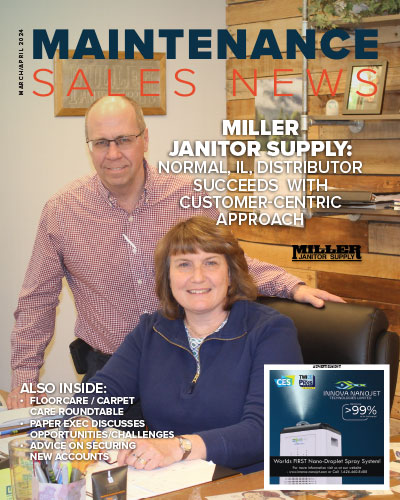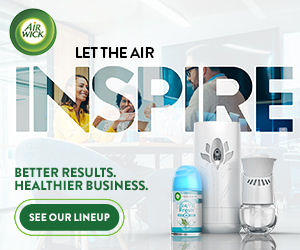Paper Executive Discusses Opportunities And Challenges Ahead For AFH Towel And Tissue Marketplace
By Harrell Kerkhoff Maintenance Sales News Editor
Describing the overall outlook for the North American professional hygiene paper and tissue business in 2024 as “healthy” is Essity’s Michael Berkowitz, Director of Customer Marketing & Commercial Excellence, Professional Hygiene, North America. He pointed out that more people are expected to visit away-from-home (AFH) facilities this year, and thus will use more paper and tissue products at such venues.
For example, according to Berkowitz:
- The International Air Transport Association has stated it’s expecting a significant increase in passenger air traffic in 2024, surpassing pre-pandemic levels by 200 million passengers;
- Restaurants in general are reporting a steady growth in customer traffic, involving in-house dining, takeout, and delivery; and,
- Various reports indicate an improving U.S. manufacturing sector. Berkowitz noted that S&P Global Market Intelligence Chief Business Economist Chris Williamson recently stated: “Manufacturers have started the year with a spring in their step. Business optimism about the year ahead has surged to its highest since early 2022, thanks to a jump in demand.”
Berkowitz added there continues to be issues with rising factory costs as a result of supply delays, but in general a positive outlook remains in manufacturing.
One grey area involving the North American professional hygiene paper and tissue business is the office sector, as there are still fewer people working in an office setting five days a week, compared to before the pandemic. That issue remains despite an increase in “return to work” mandates, according to Berkowitz.
“There’s unpredictability surrounding which days of the week are the busiest when it comes to people working in an office, as opposed to working from home. Average office occupancy rates are currently hovering around 50 percent, but the problem is some parts of the week have less than a 30 percent occupancy rate while other times its 70 percent,” Berkowitz said. “Such a wide range obviously creates challenges for cleaning contractors and facility maintenance companies when it comes to properly satisfying cleaning and inventory needs.
“I do believe greater adoption of advanced technology is going to be critical in 2024, helping cleaning contractors and facility maintenance companies better adapt their staffs and inventory to required levels of service. In general, it appears many AFH consumers are returning to their pre-pandemic behaviors. That means facilities must be prepared with the right hygiene-related products to meet evolving end-customer needs and expectations. I also feel the double-digit up-and-down swings associated with AFH paper and tissue demand should be over for now, as more people fully return to normal activities.”
Ongoing labor shortages across many industries, including the AFH sector, is also pushing companies to seek out, and relay on, technology. Berkowitz said building service contractors are a good example.
“Many have fewer workers to conduct cleaning tasks. On one hand, they could increase wages to incentivize more workers to stay, but that does not always address all their staffing challenges. Today’s technology involving the Internet of Things (IoT) is helping many address different pain points, such as making sure paper and soap dispensers are properly filled throughout a facility,” he said. “That can result in hundreds of hours per year in labor savings.
“Technology can also help satisfy today’s heightened public demand for more hygienic and overall cleaner facilities. The pandemic has left the public hyper-aware of their surroundings. (AFH) consumers expect facilities to maintain high standards to reduce the spread of germs. (At Essity) we conducted our own internal research that showed 80 percent of visitors expect public restrooms to provide a safer and more hygienic environment, compared to pre-pandemic levels.”
Berkowitz also spoke about the current level of paper/tissue availability within the North American AFH marketplace. He said availability has improved a bit as of late but remains tight. A recent industry report indicated tissue parent role production was relatively flat in 2023, compared to 2022.
“Converted product shipments actually recorded a marginal negative change,” he said. “I think a driver for a slight increase in total tissue consumption involves a slight increase in net imports of tissue, particularly converted tissue products. Looking ahead, I feel overall paper will remain tight unless demand contracts. However, based on what we’re seeing across different industry segments, I don’t anticipate that to be the case.”
When asked what distributors can do to increase their presence within the paper/tissue marketplace to attract more end-customers, Berkowitz discussed the growing importance of omnichannel benefits, involving a seamless and positive in-store, mobile, and online experience.
“That has really changed the B2B landscape, and I think can create a fantastic opportunity for distributors,” he explained. “We know that distributor webshops are among the top two sources when purchasers are researching professional hygiene products. We also know that buyer expectations are changing. For example, the Winterberry Group did research that suggests 75 percent of B2B buyers expect more of a B2C experience. That is probably not surprising as a growing number of people have spent more time at home and have become comfortable with online shopping.
“Also, Gartner, Inc., predicted that 80 percent of all B2B customer interactions will be digital by 2025. I read as well a McKinsey & Company research report suggesting 57 percent of buying decisions are made before an end-customer engages with a distributor sales rep. Now, in my opinion, that does not diminish the role of the DSR, but it does impact the way distributors need to go to market.”
The term “omnichannel” can be defined as a “seamless and integrated experience for customers — both offline and online.” Berkowitz said distributors can obviously play a critical role in both areas. From an offline perspective, distributors need to work closely with their manufacturer partners, making sure distributor teams are trained and have a good understanding of what products, tools, and services that each manufacturer offers to solve very specific customer needs across different industry segments — and even within different areas of a facility.
From an online omnichannel perspective, Berkowitz listed three key areas for distributors to focus on:
- “The first is what I would describe as ‘shopability’ — making sure you’ve got the right assortment of products listed online, involving the best product detail pages and the best content and videos, and then making sure that the products listed are in stock and available to order.
- “The second area involves ‘findability,’ ensuring it’s easy to find the right products through search and taxonomy. That can also include the easy finding of product ratings, reviews, variations, and having available cross-selling capabilities on your website.
- “Thirdly, it’s important to focus on improved product ‘visibility.’ That can include promotional tactics. One popular tactic that we’re seeing in the more advanced stage of omnichannel partnership is called a ‘dedicated brand shop.’ This gives the distributor a great landing spot to send in customers. It can include off-site media and eblasts to better grab the attention of customers. It allows the distributor to customize and tailor an experience — to not only showcase products but also share thought leadership content, industry expertise, information about sustainability, etc.”
Berkowitz added the key is to optimize the end-customer experience over time, which can often succeed when a distributor and a manufacturer work in close partnership and are willing to share data. The result can be the development of improved promotional tactics.
Helping end-customers meet their environmentally friendly/sustainable goals — as it pertains to paper, tissue and other AFH products — is also important for a distributorship, as many of today’s end-customers are more focused on truly understanding environmental positions that involve products, services, and businesses. Berkowitz said distributors can leverage their effectiveness as a product and service consolidator, which allows them to promote and highlight certified sustainable paper as well as adjacent hygiene product bundles.
“Distributors can provide holistic solutions connected to an end-customer’s sustainability objectives,” Berkowitz explained, “such as making sure that sustainability attributes, claims, and third-party certifications are part of a product’s searchable metadata, and that such information is readily available on the distributor’s webshop and product detail pages. That allows end-customers to easily search and meet their needs.
“For example, I know of a distributor webshop that has 275 products featuring climate pledge-friendly certification. For that group of products, the distributor receives 10 percent more views compared to traditional products that don’t have such certification. We’re also seeing that items featuring sustainable keywords in the product title are experiencing a 10.5 percent lift in sales, compared to products that don’t include such sustainable keywords.”
Berkowitz added that product innovation remains the lifeblood of the professional hygiene paper and tissue business.
“For manufacturers, this is our opportunity to help shape the market by creating differentiation and superiority, while also transforming the way customer problems are solved,” he said. “For distributors, innovation is what makes their jobs fun. I spent more than 20 years in distribution, involving a variety of roles. The one thing that never changed in any of those roles was finding success with manufacturers that were good at bringing innovation to market.
“It’s important to remember that innovation helps end-customers complete their tasks in a more efficient, hygienic, and sustainable manner — while also improving staff and guest experiences.”
Essity is a leading global hygiene and health company, dedicated to improving well-being through its products and services. Sales are conducted in approximately 150 countries under the leading global brands TENA and Tork, and other strong brands, such as Actimove, JOBST, Knix, Leukoplast, Libero, Libresse, Lotus, Modibodi, Nosotras, Saba, Tempo, TOM Organic, Vinda and Zewa. Essity has about 48,000 employees. Net sales in 2022 amounted to approximately SEK 156bn (EUR 15bn). The company’s headquarters is in Stockholm, Sweden, and Essity is listed on Nasdaq Stockholm. Essity breaks barriers to well-being and contributes to a healthy, sustainable, and circular society. More information is at www.essity.com.
The Tork brand offers professional hygiene products and services to customers worldwide ranging from restaurants and healthcare facilities to offices, schools and industries. Tork products include dispensers, paper towels, toilet tissues, soap, napkins and wipers, but also software solutions for data-driven cleaning. Through expertise in hygiene, functional design, and sustainability, Tork has become a market leader that supports customers to think ahead so they’re always ready for business. Tork is a global brand of Essity and a committed partner to customers in more than 110 countries. To keep up with the latest Tork news and innovations, visit Torkusa.com.





